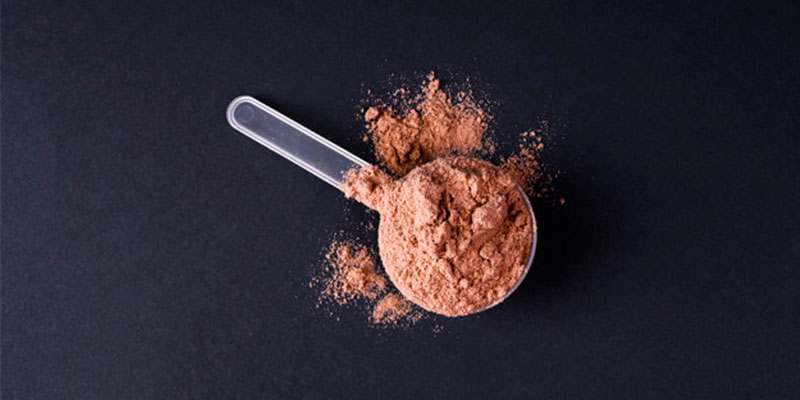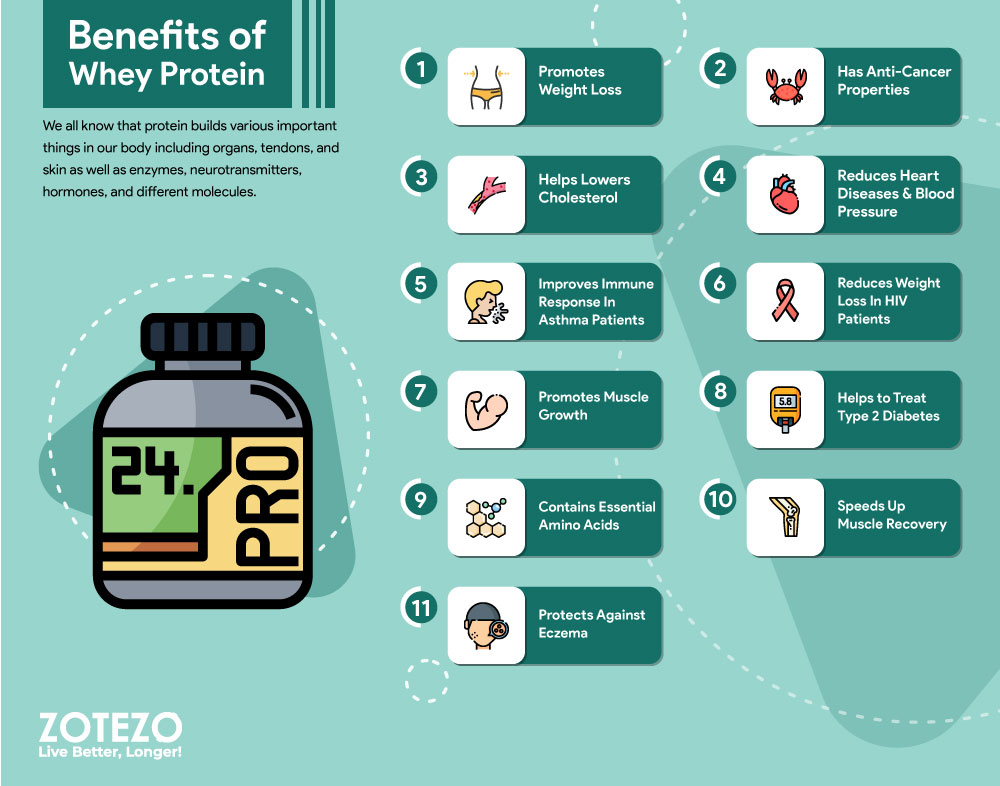Whey Protein: Benefits, Types, Sources, Dosage, and Side Effects

Introduction
Over the last few decades, whey protein has taken the world by storm due to its well-researched benefits and high digestibility.
We all know that protein is essential to perform almost all functions in our body, from rebuilding our cells and tissues to synthesizing enzymes, from supporting muscle contraction and nervous systems to keeping bodily fluids in balance. Getting enough protein in your diet is really essential and whey protein is more beneficial for your health than other types of supplements as it contains more protein and a lesser amount of lactose and fat.
Whey protein is one of the most common supplements for lean muscle growth. It is filled with an incredible range of essential amino acids that are absorbed quickly by the body. Moreover, whey helps to gain muscle, increase strength and lose a significant amount of body fat.
In this article, we will tell you everything about whey protein- what is whey, how it works, and how it can help you.
Avertisement
What Is Whey Protein?
Whey is the watery portion of the milk that gets separated during cheese production. Whey protein is a mixture of proteins that is isolated from whey.
Basically, milk contains two types of protein: the main fatty part contains casein (80%) and the watery part contains whey (20%).
At this time of cheese production, the fatty part of the milk gets coagulated and as a byproduct, whey is separated from it. Whey goes through various stages of processing, after getting separated during cheese production.
The dry whey protein powder doesn’t really taste good on its own, as a supplement, that’s why chocolate, strawberry, vanilla, and other flavours are usually mixed with it.
Avertisement
Composition of Whey Protein
Whey protein is a combination of some globular proteins that are isolated from the whey part of the milk. The protein in cow’s milk contains 80% casein and 20% whey (whereas in human milk it’s 30% casein and 70% whey).
Whey protein is typically a mixture of alpha-lactalbumin (25%), beta-lactalbumin (65%), bovine serum albumin (8%), and immunoglobulins. These proteins are soluble in their native forms and independent of pH.
Avertisement
Use of Whey
Whey protein is used to make brunost, ricotta, whey butter and many other products. The fat concentration of whey protein is really low. To make 1 kg of whey butter, 1,000 kg of whey proteins are required.
Whey protein is also useful to make many processed foods like bread, crackers, and pastry. Whey proteins contain α-lactalbumin and β-lactoglobulin.
Whey Cream And Butter
Whey cream is separated from the whey (instead of the milk) as a by-product of cheese making. Whey butter and cream have a lower fat content and it tastes more tangy, salty and cheese-like. Whey cream and butter is way cheaper than normal sweet cream and butter. As they have a stronger flavour of their own, whey cream and butter are more suitable for making any butter-flavored food.
Whey Protein
Whey protein is generally marketed as a nutritional supplement. The alternative medical community has claimed many health benefits of whey protein.
In most protein powders, whey is the primary ingredient that is used by bodybuilders and athletes. Whey protein contains a high level of leucine which is essential for muscle growth and repair.
Avertisement
Types of Whey Protein
The whey proteins are mainly of three types.
1. Whey Protein Concentrate (WPC)
Whey protein concentrate or WPC is the least expensive type of whey protein available. The amount of protein present in it varies between 25-89%. The rest of the product consists of fat (1-9&), lactose (4-52%), minerals and moisture. WPC is generally used in protein beverages and bars, in bakery and confectionery products, and in infant formula. Usually, in the market WPH comes with artificial flavours that make it tastier.
2. Whey Protein Isolate (WPI)
In terms of protein concentration, WPI is a more improved version of WPC. it contains almost 90-95% of protein. It is even good for lactose-intolerant individuals, as it contains little or no lactose. Whey protein isolate is more costly than WPC as further processing is required to make it more concentrated. WPI is used in protein supplementation products, protein beverages, protein bars, and other nutritional food products.
3. Whey Protein Hydrolysate (WPH)
Whey protein hydrolysate (WPH) is the least tasty and most expensive type of whey protein. The body can easily absorb this whey protein, as here, the protein has been broken down into shorter peptide chains. It has 85-90% protein and is generally used in infant formula and sports and medical nutrition products.
Avertisement
How Does Whey Protein Work?
Whey protein is a source of protein that can improve the nutrient concentration of the diet. Whey protein also improves the immune system. It contains BCAAs that help in muscle building and repair.
Avertisement
Whey Protein Nutritional Facts
One scoop (approx 30 g) of the average whey protein powder contains only 113 calories, of which 4% is the fat content. The total fat content in one scoop of whey protein is 0.5 g, of which 0.3g is saturated fat and 0 g is trans fat. Monounsaturated and polyunsaturated fat is 0.1 g each. Cholesterol is only 5.1 mg (this is 2% of the daily required amount). The sodium content of whey protein is 50mg, which would make up for 2% of your daily need. Potassium concentration is 160 mg, and total carb content is 2 g. 25 g Protein is in the measured amount of whey protein powder. You will also find 2% iron and 12% calcium in it.
Avertisement
Benefits of Whey Protein
We all know that protein builds various important things in our body including organs, tendons, and skin as well as enzymes, neurotransmitters, hormones, and different molecules.
Whey protein has several health benefits as well.
1. Promotes Weight Loss
Protein helps to lose weight faster, as it keeps you full and reduces cravings and hunger. Regular intake of whey protein helps to lose a significant amount of body fat and also helps to preserve lean muscles. It can boost energy expenditure up to 80-100 calories per day.
2. Has Anti-Cancer Properties
Whey proteins have some anti-cancer properties as they are rich in Cysteine fragments and Lactoferrin. The cysteine-rich fragments of whey protein enhance glutathione production. Glutathione can help to reduce the size of the tumour. While binding to iron, whey protein can modulate oxidation.
3. Lowers Cholesterol
A study shows that Whey protein supplements can decrease total cholesterol and LDL cholesterol level.
4. Reduces Cardiovascular Diseases And Blood Pressure
Regular consumption of whey protein supplements can significantly reduce blood pressure in hypertension patients. The risk of stroke and other heart diseases also lowers with regular intake of whey protein.
5. Improves Immune Response In Asthma Patients
Whey protein supplements may improve the immune response in asthma patients. Taking only 10 g of whey protein twice per day can significantly boost your immune system.
6. Reduces Weight Loss In HIV Patients
A common problem of all HIV patients is that they lose a tremendous amount of weight. Whey protein may help to reduce this weight loss in them.
7. Whey Protein Promotes Muscle Growth
Leucine, a branched-chain amino acid is in the whey protein. It improves muscle growth and prevents age-related muscle loss.
8. Helps Treat Type 2 Diabetes
Whey protein increases insulin levels and decreases the level of blood sugar after a high-carb meal. It has been shown in some diabetic patients that whey protein helps to moderate blood sugar levels.
9. Contains Essential Amino Acids
Whey protein contains branched-chain amino acids (BCAA) leucine, isoleucine, and valine. BCAAs stimulate muscle protein synthesis at the genetic and molecular levels.
10. Speeds Up Muscle Recovery
Whey protein improves muscle function by building lean muscle mass by releasing anabolic hormones such as insulin. Whey protein generates muscle growth faster than any other protein.
11. Protects Against Eczema
Infants who consume whey protein show a lower risk of developing red, itchy skin and allergic conditions.

Avertisement
Production of Whey Protein
At the time of cheese production, an edible acid or rennet (a complex set of enzymes) is added to heat the milk. When the milk gets coagulated, the solid milk is separated from the liquid whey. Sour whey is a byproduct of acid-coagulated milk and sweet whey is a byproduct of rennet-coagulated milk. The liquid whey is separated, pasteurized, and then dried to form the powdery whey.
High heat (more than 72°C) can denature whey protein easily. This heat-denatured whey protein can cause an allergic reaction in some people.
After isolation whey protein is first pasteurized like other kinds of milk, which ensures there are no harmful bacteria breeding in the liquid. Then it is heated to 70-80 °C rapidly and then cooled back down to 4 °C. The process of using this extreme temperature eliminates 99.7% of bacteria.
Avertisement
Dosage of Whey Protein
The usual recommended dose of whey protein is 25-50 grams (1-2 scoops) per day, after a workout. Always follow the instructions written on the packaging.
Just remember if your protein intake is high already then adding whey protein in your diet is completely unnecessary.
Avertisement
Side Effects Of Whey Protein
Whey protein does not harm the kidneys or liver but people with damaged kidneys and livers may go through some problems. High doses of whey protein may cause nausea, thirst, bloating, cramps, fatigue, headache, and reduced appetite.
- For pregnant or lactating women, there is no reliable information about the safety of taking whey protein. Avoid the use of whey protein to stay on the safe side.
- Avoid using whey protein, if you are allergic to cow milk.
Generally, most people can consume whey protein without any problem as it has an excellent safety profile.
Avertisement
How Can You Take Whey Protein?
The daily required amount of whey protein entirely depends on an individual’s daily protein needs. For instance,
- In the case of an athlete, or a highly active person who is trying to lose body fat while preserving lean muscle mass should intake 1.5-2.2g/kg bodyweight.
- In the case of a person who is trying to lose body weight should intake 1.0-1.5g/kg bodyweight.
- If you just want to add protein to your diet then you can go for 0.8g/kg bodyweight.
If you get enough protein through the normal diet then adding supplements is not necessary. Obese people should consult a doctor before taking any supplements.
Avertisement
Expert Speak on Whey Protein
Dietitian Vinit Baptist in an exclusive conversation with Zotezo on the Importance of Whey Protein
Avertisement
Bottom Line
Whey protein is a quality protein source that can be absorbed and utilized by the human body efficiently. It is a perfect way to add more protein to your regular diet.
It is really beneficial for people who need to lose weight and gain muscle mass. There are many brands in India that make the best whey proteins for muscle growth and weight loss.
Do you find this article helpful? Did we miss out on anything? Don’t forget to let us know in the comments section below.




Responses